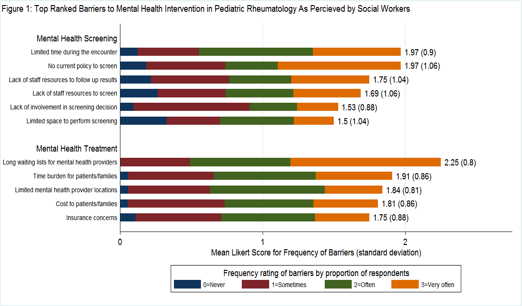Session Information
Session Type: Abstract Submissions
Session Time: 5:30PM-7:00PM
Background/Purpose: Mental health problems are common, but undertreated in adolescents with rheumatologic conditions. As social workers help manage medical and psychosocial aspects of illness, we examined their perspectives to identify opportunities for improving mental health care of these adolescents.
Methods: We surveyed social workers at pediatric rheumatology centers in the Childhood Arthritis and Rheumatology Research Alliance (CARRA). The online survey assessed demographics, beliefs, preferences, and practices for mental health care of adolescents with lupus, juvenile idiopathic arthritis, or juvenile dermatomyositis. Participants rated the frequency of 15 barriers to mental health screening and 18 barriers to treatment on a 4-point Likert scale. Survey participants were invited for semi-structured qualitative interviews to collect in-depth information to complement the survey data.
Results: One third of CARRA centers had no social worker. Of 44 social workers contacted, 37 (84%) responded to the survey. Excluding 5 incomplete responses, 32 were analyzed. Social workers were located mostly at US university-based (81%) and urban (75%) centers, spending a mean of 0.5 full-time effort (SD 0.3) in pediatric rheumatology. Most supported routine universal screening of rheumatology adolescents for depression (94%), anxiety (94%), and distress/coping (100%); none reported this as current practice. Willingness to administer screening was expressed by 88%. Of the 15 (47%) reporting screening of selected patients, only 4 had a protocol for handling the results. High accessibility of on-site psychologists and psychiatrists was reported by 32% and 19%, respectively. Forty-seven percent reported that follow-up by their center after mental health referral was inadequate. Although 94% had formal mental health training, only 6 (19%) provided psychological counseling/therapy to adolescents in rheumatology; of the 26 not providing therapy, 81% said it was not in their current scope of practice. Limited resources, lack of policy, and patient cost/time burden were among the most frequent barriers to mental health care (Figure 1). Interviews (n=15) revealed detailed information on barriers and facilitators (Table 1).
Conclusion: Almost all social workers at pediatric rheumatology centers have mental health training, and although willing, are underutilized to provide services. With adolescents facing many barriers to mental health care, social workers represent an untapped resource for routine mental health screening and timely intervention as part of comprehensive rheumatology care.
To cite this abstract in AMA style:
Knight A, Vickery M, Faust L, Muscal E, Davis AM, Harris J, Hersh AO, Rodriguez M, Onel K, Schanberg LE, Rubinstein T, Washington N, Weitzman E, Conlon H, Gerstbacher D, Woo J, Von Scheven E. Underutilization of Social Workers for Mental Health Care of Adolescents in Pediatric Rheumatology: A Mixed Methods Study [abstract]. Arthritis Rheumatol. 2017; 69 (suppl 4). https://acrabstracts.org/abstract/underutilization-of-social-workers-for-mental-health-care-of-adolescents-in-pediatric-rheumatology-a-mixed-methods-study/. Accessed .« Back to 2017 Pediatric Rheumatology Symposium
ACR Meeting Abstracts - https://acrabstracts.org/abstract/underutilization-of-social-workers-for-mental-health-care-of-adolescents-in-pediatric-rheumatology-a-mixed-methods-study/


